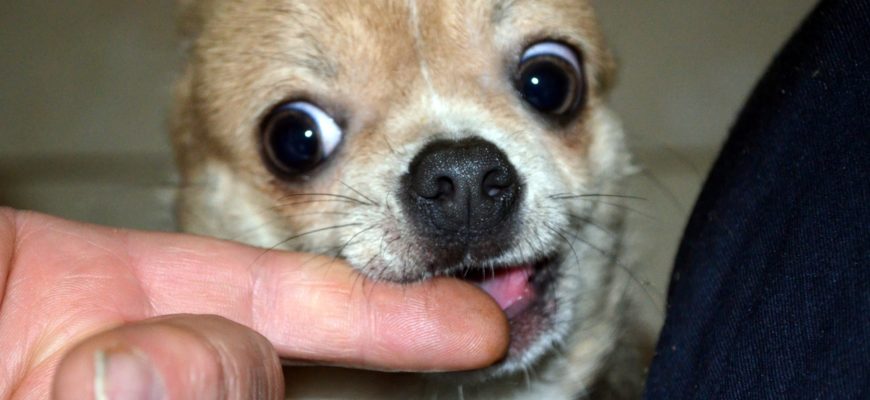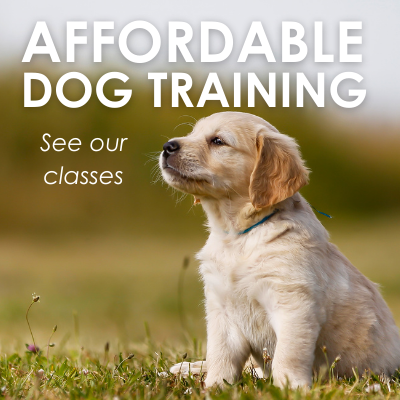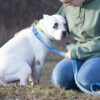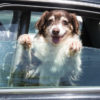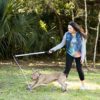When puppies play with each other, they use their mouths. Therefore, puppies usually want to bite or “mouth” hands during play or when being petted. With puppies, this is rarely aggressive behavior in which the intent is to do harm. Because puppies are highly motivated to exhibit this type of behavior, attempts to suppress it or stop it are unlikely to be successful unless you give your puppy an alternative behavior. The goals of working with this normal puppy behavior are to redirect your puppy’s desire to put something in her mouth onto acceptable chew toys and to teach her to be gentle when a hand is in her mouth.
Encourage Acceptable Behavior
Redirect your puppy’s chewing onto acceptable objects by offering her a small rawhide chew bone or other type of chew toy whenever you pet her. This technique can be especially effective when children want to pet her. As you or the child reach out to scratch her behind the ears (not over the head) with one hand, offer the chew bone with the other. This will not only help your puppy learn that people and petting are wonderful, but will also keep her mouth busy while she’s being petted. Alternate which hand does the petting and which one has the chew bone. At first, you may need to pet or scratch your puppy for short periods of time, since the longer she’s petted, the more likely she is to get excited and start to nip.
Discourage Unacceptable Behavior
You must also teach your puppy to be gentle with hands. Teach your puppy that nipping “turns off” any attention and social interaction with you. After a nip, stand up, turn away, and remove attention for a moment. Leave the room if you must, but ignore her until she’s calm, then try the chew bone and petting method again. It’s even better if you can coax your puppy into a sitting position using food. It may take many repetitions for her to understand what’s expected.
Remember that any of these three methods will probably not be effective unless you work hard to teach your puppy the right behavior by offering her an acceptable chew toy.
Jumping Up
When your puppy jumps up on you, she wants attention. Whether you push her away, knee her in the chest or step on her hind legs, she’s being rewarded for jumping up (even though it’s negative attention, she’s still getting what she wants).
When your puppy jumps up
- Fold your arms in front of you, turn away from her and say “off.”
- Continue to turn away from her until all four of her feet are on the ground, then quietly praise her and give her a treat. If she knows the “sit” command, give the command when all four of her feet are on the ground, then quietly praise her and give her a treat her while she’s in the sitting position.
- When you begin to praise her, if she begins to jump up again, simply turn away and repeat step two, above. Remember to keep your praise low-key. When your puppy realizes that she gets no attention from you while she’s jumping up, but does get attention when she stops jumping up and sits, she’ll stop jumping up. Remember, once you’ve taught her to come and sit quietly for attention, you must reward her behavior. Be careful not to ignore her when she comes and sits politely, waiting for your attention.
What Not To Do
Attempts to tap, slap or hit your puppy in the face for nipping or jumping up are almost guaranteed to backfire. Several things may happen, depending on your puppy’s temperament and the severity of the correction:
- She could become “hand shy” and cringe or cower whenever a hand comes toward her face.
- She could become afraid of you and refuse to come to you or approach you at all.
- She could respond in a defensive manner and attempt to bite you to defend herself.
- She could interpret a mild slap as an invitation to play, causing her to become more excited and even more likely to nip.
A Note about Children and Puppies
It’s very difficult for children under eight or nine years old to practice the kind of behavior modification outlined here. Children’s first reaction to being nipped or mouthed by a puppy is to push the puppy away with their hands and arms. This will be interpreted by the puppy as play and will probably cause the puppy to nip and mouth even more. Dogs should never be left alone with children under ten and parents should monitor closely all interactions between their children and dogs.
Information Adapted from Denver Dumb Friends League, www.ddfl.org




